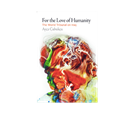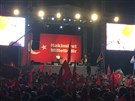I am writing on 27 February 2011, when there are calls for the international community to intervene, if necessary with violence, into Libyan affairs. Most recently, and “in a distinct echo of the tactics they pursued to encourage US intervention in the Balkans and Iraq, a familiar clutch of neo-conservatives appealed Friday for the United States and NATO to "immediately" prepare military action to help bring down the regime of Libyan leader Muammar Gaddafi.” Falling short of some expectations, and exceeding others, the United Nations Security Council passed a resolution last night, on 26 February, imposing sanctions on Libya. “Considering that the widespread and systematic attacks currently taking place in the Libyan Arab Jamahiriya against the civilian population may amount to crimes against humanity,” the Security Council also decided to refer “the situation” to the International Criminal Court (ICC).
Meanwhile, Libya, as an actor in global politics, is said to be a sovereign state. The Security Council resolution thus “reaffirms its strong commitment to the sovereignty, independence, territorial integrity and national unity” of Libya. Under “normal” conditions, that is, within limits, Libya is recognized as an autonomous actor, capable of self-determining its “internal” and “external” affairs without international interference. On the other hand, the very framing of the state violence unleashed against the uprising citizens of Libya as a potential “crime against humanity” suggests that the limits of state-sovereignty may have been reached. What are these limits, who draws them, and how?
From the perspective of “the international community,” sovereignty is a privilege it confers onto Libya, a status with certain responsibilities attached. Among these responsibilities, the Security Council recalls, is the “Libyan authorities’ responsibility to protect its population.” As elaborated in the context of the NATO intervention in Kosovo (and subsequently adopted by the UN at its 2005 World Summit Outcome), when a state fails to fulfill this responsibility, the logic goes, then the international community must take on “the responsibility to protect” the population in question (see a critical evaluation of this normative and legal framework here). As we have seen with the forceful “liberation” of Iraq, in conjunction with “the responsibility to protect” framework, some further argue that beyond its coercive capacity and responsibility to protect its population, a state must be democratic to “earn” the recognition and affirmation of its sovereignty by the international community.
Who makes up this international community itself, who are its actors? Once known as the “comity of civilized nations,” the international community is traditionally understood as a collection of sovereign states. In the last four decades, moreover, various actors — from the United Nations Security Council to Human Rights Watch, from the European Union to Amnesty International, from the United States to the North Atlantic Treaty Organization — have all spoken as the international community. Finally, today, many cosmopolitans would insist that besides (or even beyond) states and institutions, individuals, as humans, are the international community’s legitimate “members.”
If sovereignty is the recognized privilege of an “autonomous” state within the international legal framework, it is neither conferred indiscriminately, nor maintained indefinitely. In fact, throughout history, various standards have been formulated and applied in deciding the sovereign status of a given entity. While international lawyers developed “the standard of civilization” in the nineteenth century to discriminate sovereign from non-sovereign or quasi-sovereign entities in the context of colonization, in the twenty-first century, countless other practitioners and theorists have specified and elaborated “universal standards” which an entity such as Libya should meet if its sovereign status is to be affirmed by the international community. Some cosmopolitans are less humble, and project their vocation as the articulation of “universal principles which must shape and limit all human activity”; these universal principles are thus the designation of “necessary boundaries which no human activity should cross.” In the cosmopolitan case, what must be administered are not merely the standards sovereign states must adhere to, but “the proper limits to human diversity” as such, in David Held’s enthusiastic cosmopolitan formulation. (Note that a universal jurisdiction declared over “all human activity” necessitates an anthropology of “humanity” in order to first define, and then police, “the boundaries which no human activity should cross.” Further, it remains unclear what such boundaries might mean for Professor Held’s “informal mentorship” to Colonel Gaddafi`s son at the London School of Economics, or his serving as a trustee for the Gaddafi International Charity and Development Foundation.)
Until recently — specifically, until 2008, when the United States reached an agreement with Libya to fight as comrades in the Global War on Terror — Libya was considered a “rogue state” by the United States. However, the Bush Administration announced that it was resuming “normal diplomatic relations” with Libya as early as May 2006. Secretary of State Condoleezza Rice explained this move by noting “Libya’s continued commitment to its renunciation of terrorism and the excellent cooperation Libya has provided to the United States and other members of the international community in response to common global threats faced by the civilized world since September 11, 2001.” Similar to a number of “failed states” around the world, which were said to have failed morally, economically, politically, or effectively according to certain “international standards,” Libya was also part of the Axis of Evil. It had the ambiguous status of an “outlaw,” a quasi-sovereignty, a dangerous entity to be sanctioned, isolated, and contained, if not destroyed altogether. Yesterday, when the Security Council referred Libya’s case to the International Criminal Court, it further marked its leadership as suspected enemies of humanity. In its resolution, the Security Council also affirmed that “it shall keep the Libyan authorities’ actions under continuous review, and that it shall be prepared to review the appropriateness of measures contained in this resolution,” reserving the possibility of strengthening its “measures.”
What might such strengthening look like? How should this Security Council resolution be evaluated? Towards a conclusion, other members of the international community may reach a different resolution:
. Recalling the unwillingness of the Security Council and the International Criminal Court to initiate investigations about allegations of war crimes committed by the U.S., the U.K., and other “Great Powers” in Iraq and elsewhere;
. Recalling the illegitimate and undemocratic structure of the United Nations Security Council, which grants permanent seats, and veto rights, to “Great Powers”;
. Underlining that the UN Security Council does not have an authority to speak in the name of humanity or the international community;
. Affirming that the citizens of Libya have taken their destiny into their own hands by an uprising against their government, and that they are the legitimate deciders of their future;
. Noting that the threat of war crimes prosecution may create perverse effects and incentives, and that more state violence may be unleashed on Libyan citizens as a consequence;
. Observing that the strengthening of measures by the United Nations Security Council may involve an international intervention justified on the grounds of crimes against humanity;
. Concludes that the UN Security Council Resolution 1970 further exposes the double-standards of this institution which arrogates itself an authority to decide on behalf of humanity.
And whose resolution could this be? Of those who reach the same conclusion. The conclusion that, after all, Libya as well as the “Great Powers” are “rogue states”. The conclusion is, if one agrees with Jacques Derrida:
… those states that are able or are in a state to denounce or accuse some “rogue states” of violating the law, of failing to live up to the law, of being guilty of some perversion or deviation, those states that claim to uphold international law and that take the initiative of war, of police or peacekeeping operations because they have the force to do so, these states, namely, the United States and its allied states in these actions, are themselves, as sovereign, the first rogue states.
![[The UN Security Council in session. Image from alphabetic.info]](https://kms.jadaliyya.com/Images/357x383xo/UN-Security-Council-image-from-a-jan.-6-2009-meeting.jpg)










